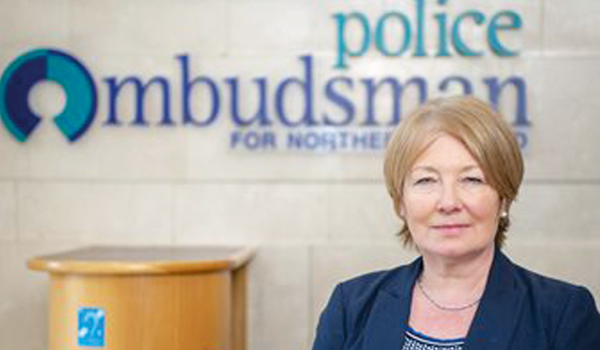PPS will not prosecute Police Ombudsman over misconduct allegations
The Public Prosecution Service (PPS) has taken a decision not to prosecute the Police Ombudsman for Northern Ireland who was reported for potential offences of perverting the course of justice and misconduct in public office.
After careful consideration of a file submitted following an investigation led by West Midlands Police into alleged actions by Marie Anderson, it was concluded by prosecutors that there was no reasonable prospect of conviction for any criminal offence.
The Ombudsman was investigated in relation to events arising from a reported domestic incident in Holywood, Co Down, in September 2023.
The Police Service of Northern Ireland (PSNI) investigated events arising from the incident, which resulted in a male receiving a caution for the offence of common assault.
The PSNI requested that West Midlands Police lead an investigation into separate allegations against the Ombudsman in relation to her conduct during the early stages of the PSNI investigation.
In September 2024, an initial police file was submitted to the PPS to enable early consideration of the evidence in relation to the Ombudsman. An issue relating to the conclusion of a police interview process was resolved in May 2025.
Following this, a full police investigation file was submitted to the PPS on June 9, 2025, reporting the Ombudsman for potential offences of perverting the course of justice and misconduct in public office.
Mrs Anderson, who was to retire in December this year, took “temporary leave of absence” that same month, delegating authority to her chief executive.
Director of Public Prosecutions Stephen Herron said: “This was a complex and sensitive matter which was given careful consideration by a team of senior prosecutors and highly experienced independent Senior Counsel.
“This case has understandably generated significant public interest and speculation – much of which was factually inaccurate.
“The events of September 2023 that led to this investigation were undoubtedly difficult. The evidence shows that PSNI engaged with the Ombudsman with care and sensitivity, and their investigation was conducted properly and in good faith.
“The central allegation in this case was that the Ombudsman had misconducted herself in public office and/or attempted to pervert the course of justice through her interactions with police who were investigating the incident.”
He added: “The legal threshold for both offences is high. In assessing whether the Test for Prosecution was met, prosecutors considered all of the relevant facts and circumstances including the particular context in which the interactions took place; contemporaneous records made by police in relation to what was said by her; and the evidence from senior police who spoke directly to the Ombudsman during key stages of the relevant events.
“It was concluded that the evidence was insufficient to establish that the Ombudsman was either acting or purporting to act as a public officer at the relevant times; or that she misconducted herself or attempted to pervert the course of justice through anything she said or did in response to police enquiries.”
PSNI Deputy Chief Constable Bobby Singleton said: “The Public Prosecution Service has now considered the evidence and directed ‘no prosecution’ as the investigation did not pass their evidential test.
“Where there are reasonable grounds to suspect the commission of criminal offences it is the duty of police to investigate those matters. Police will make relevant enquiries, interview those with information, question suspects and, in consultation with the PPS, either charge a person or submit a file to the PPS in relation to the investigation. This procedure was followed in this case.
“This was an extremely complex and challenging investigation and the difficulties that police encountered have been fully acknowledged by the PPS. I want to echo the comments of the PPS on the high standard of the police investigation. I also want to place on record my thanks to the independent investigation team from West Midlands and Greater Manchester Police for the professional and thorough investigation they conducted.”
He added: “The delays in progressing the case were beyond the control of the PSNI and the independently-led investigation team. Police of course have a duty to impartially investigate all potential crime without fear or favour and in accordance with the law and we are committed to doing so. I have full confidence that those duties were discharged in this investigation.
“Prosecutorial decisions are made independently by the PPS and it would be inappropriate to comment further other than to reiterate the Police Service’s commitment to treat everyone equally before the law.”
The chair of the Police Federation for Northern Ireland, Liam Kelly, says PPS praise for the actions of officers involved in the Ombudsman incident reflects the professional and impartial manner in which they went about their work.
Mr Kelly said: “Officers who were involved in this matter acted professionally without fear or favour. They behaved impeccably and meticulously in the way they went about what was a difficult incident and subsequent investigation.
“It is up to the PPS to explain why it is not proceeding with charges in this case, but it is clear they had nothing but praise for the officers involved.
“The Police Ombudsman has to be held to the highest possible standards with full accountability mechanisms in place. If anything, this Federation would like to see those mechanisms reviewed and strengthened in order to build confidence with police officers and the public.
“The PPS description of the actions of officers on the night of the incident as being conducted with ‘care and sensitivity’ and ‘properly and in good faith’ is a ringing and most welcome endorsement. The officers should feel justifiably proud of the work they did in an objective, professional and impartial manner.
“Under no circumstances should they feel they didn’t behave correctly because of this outcome.”


